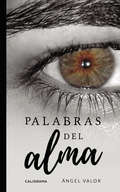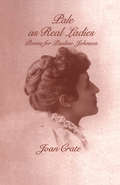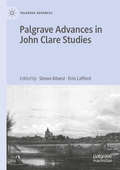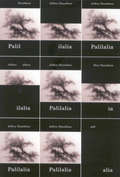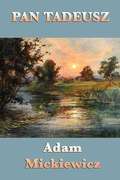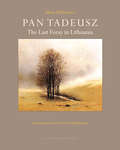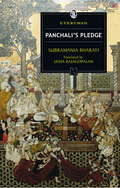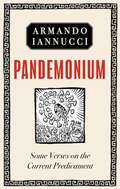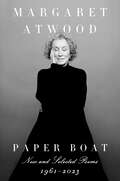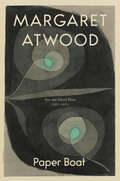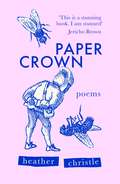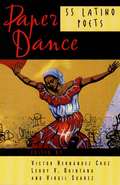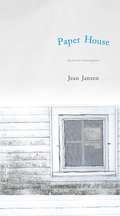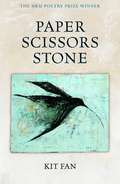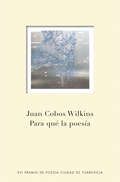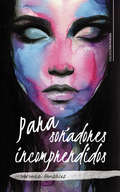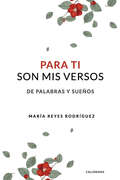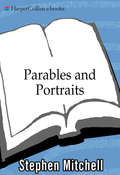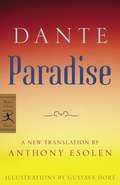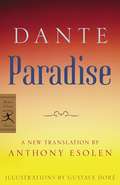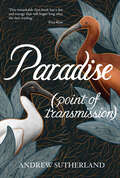- Table View
- List View
Palabras del alma
by Ángel ValorIntenta vivir cumpliendo sueños, y sueña viviendo que los consigues. Hablarse a sí mismo es un hecho que cada vez valoramos menos. La autocrítica, el sentir deliberadamente y no condicionado... Permitidme que os dé mi más humilde opinión al respecto. En cada página que expongo a continuación podréis revivir vivencias,sentiros identificados por algún suceso personal o cercano que haya transcurrido o transcurra actualmente en vuestras vidas. Pero siempre con la firme intención de proporcionar la capacidad del libre albedrío del pensamiento. No pretendo contar mis historias, sino que a través de mis historias seáis capaces de rememorar o sentir las vuestras al leerme. Sencillamente, el sentimiento nunca muere.
Pale as Real Ladies: Poems for Pauline Johnson
by Joan CrateIn powerful language that reflects the conflicts between the primitive and the sophisticated, Joan Crate redreams the passions which animated and tormented her famous predecessor. Part white, part Mohawk princess, Pauline Johnson /Tekahionwake would perform her poems first in buckskin, then, after the intermission, in silk.
Palgrave Advances in John Clare Studies (Palgrave Advances)
by Simon Kövesi Erin LaffordThis collection gathers together an exciting new series of critical essays on the Romantic- and Victorian-period poet John Clare, which each take a rigorous approach to both persistent and emergent themes in his life and work. Designed to mark the 200th anniversary of the publication of Clare’s first volume of poetry, Poems Descriptive of Rural Life and Scenery, the scholarship collected here both affirms Clare’s importance as a major nineteenth-century poet and reveals how his verse continually provokes fresh areas of enquiry. Offering new archival, theoretical, and sometimes corrective insights into Clare’s world and work, the essays in this volume cover a multitude of topics, including Clare’s immersion in song and print culture, his formal ingenuity, his environmental and ecological imagination, his mental and physical health, and his experience of asylums. This book gives students a range of imaginative avenues into Clare’s work, and offers both new readers and experienced Clare scholars a vital set of contributions to ongoing critical debates.
Palilalia
by Jeffery DonaldsonPalilalia is disordered speech. According to the Oxford English Dictionary, this lesser known vocal tic is "an involuntary repetition of words, phrases or sentences." Sister to echolalia (repeating what others say), and distant cousin to the more forbidding coprolalia (the involuntary use of obscene language), palilalia can feel, on the one hand, like an affliction to be suppressed, and on the other, like a kind of meditative mantra that focuses and intensifies your thought. "Your repetitious tics," the ghost of the poet's mentor, Northrop Frye, tells him, are " the ecstatic rhapsodist's / St. Vitus Dance, slangster's whizzle / and conjuration, philologist's hullabaloo." It isn't a question of how to stop them, but of finding how far they will take you. Jeffery Donaldson offers poems about Tourette's Syndrome, about his loves and blessings, about the erotic life as flavoured by all these, and about the grace of a stillness in the midst of so much mental noise. Paul Val�ry said that a poem is never finished, only abandoned. All poets have palilalia, or should have....
Palilalia (Hugh MacLennan Poetry Series #19)
by Jeffery DonaldsonPalilalia is disordered speech. According to the Oxford English Dictionary, this lesser known vocal tic is "an involuntary repetition of words, phrases or sentences." Sister to echolalia (repeating what others say), and distant cousin to the more forbidding coprolalia (the involuntary use of obscene language), palilalia can feel, on the one hand, like an affliction to be suppressed, and on the other, like a kind of meditative mantra that focuses and intensifies your thought. "Your repetitious tics," the ghost of the poet's mentor, Northrop Frye, tells him, are " the ecstatic rhapsodist's / St. Vitus Dance, slangster's whizzle / and conjuration, philologist's hullabaloo." It isn't a question of how to stop them, but of finding how far they will take you. Jeffery Donaldson offers poems about Tourette's Syndrome, about his loves and blessings, about the erotic life as flavoured by all these, and about the grace of a stillness in the midst of so much mental noise. Paul Val�ry said that a poem is never finished, only abandoned. All poets have palilalia, or should have....
Pan Tadeusz
by Adam MickiewiczPan Tadeusz is an epic poem by the Polish-Lithuanian poet, writer and philosopher Adam Mickiewicz. The book was first published in June 1834 in Paris, and is considered by many to be the last great epic poem in European literature. The story takes place over the course of five days in 1811 and one day in 1812 at a point in Polish history, when Poland-Lithuania had already been divided between Russia, Prussia, and Austria and disappeared from the political map of Europe.
Pan Tadeusz: The Last Foray in Lithuania
by Bill Johnston Adam MickiewiczThe national epic of Poland and touchstone of modern European literature, now in a fresh translation by award-winning translator Bill Johnston.A towering achievement in European literature, Pan Tadeusz is the central work of the Polish literary canon, heralded for its lovingly detailed recreation of a bygone world. The traditions of the Polish gentry and the social and natural landscape of the Lithuanian countryside are captured in verse of astounding beauty, simplicity, and power. Bill Johnston's translation of this seminal text allows English-language readers to experience the richness, humor, and narrative energy of the original.
Panchali's Pledge
by Subramania Bharati Usha RajagopalanHonoured at a public function when he was a mere boy of eleven with the title 'Bharati' (one blessed by Saraswati, the Goddess of Learning), C. Subramania Bharati (1882-1921) is renowned as the herald of the renaissance in Tamil literature. The simplicity and lyricism that marked his poetry reflect a clear shift in sensibility and craft from the classical tradition, which had adhered to strictures of style, imagery and language for over 2000 years. Panchali's Pledge is the English translation of Bharati's seminal work, Panchali Sabadham, which reimagines the pivotal Game of Dice incident in the Mahabharata, where coerced into playing a game of dice by Duryodhana and Sakuni, Yudhisthira, the eldest of the Pandavas, stakes and loses his kingdom, his wealth, his brothers and finally Draupadi, leading to her disrobing and her rescue by the divine intervention of Lord Krishna. Enraged at the quiet indifference of those present in the assembly at her plight, Draupadi finally takes a pledge to avenge her ignominy with the blood of the Kauravas. Bharati wrote and published the first of the two-part minor epic in 1912 while living in the French territory of Pondicherry to escape British persecution. It was intended as a political allegory to the ongoing freedom movement and as an affirmation of the latent power in women. Usha Rajagopalan's translation seeks to complement what Bharati himself set out to do with the original text: to 'create an epic using simple phrases, a simple style, easily understood prosody and rhythm which the common man appreciates.'
Pandemonium: Some verses on the Current Predicament
by Armando IannucciTell, Mighty Wit, how the highest in forethought and, That tremendous plus, The Science, Saw off our panic and Globed vexation Until a drape of calmness furled around the earth And beckoned a new and greater normal into each life For which we give plenty gratitude and pay Willingly for the vict'ry triumph Merited by these wisest gods. Pandemonium is an epic mock-heroic poem, written in response to the pandemic with all the anger and wit that Armando Iannucci brings to his vision of contemporary events. It tells the story of how Orbis Rex, Young Matt and his Circle of Friends, Queen Dido and the blind Dom'nic did battle with 'a wet and withered bat' from Wuhan.
Pandiyan Parisu
by BharadidasanPandiyan Parisu is a very popular drama written in poetic form by Pavendhar Bharadidasan.It is the story of Velan and Annam and Vezha Mannan along with few other characters told effectively in a very simple fashion that makes it very appealing to its readers.
Paper Boat: New and Selected Poems: 1961-2023
by Margaret AtwoodAn extraordinary career-spanning collection from one of the most revered poets and storytellers of our ageTracing the legacy of Margaret Atwood—a writer who has fundamentally shaped the contemporary literary landscapes—Paper Boat: New and Selected Poems, 1961–2023 assembles Atwood&’s most vital poems in one essential volume.In pieces that are at once brilliant, beautiful, and hyper-imagined, Atwood gives voice to remarkably drawn characters—mythological figures, animals, and everyday people—all of whom have something to say about what it means to live in a world as strange as our own. &“How can one live with such a heart?&” Atwood asks, casting her singular spell upon the reader and ferrying us through life, death, and whatever comes next. Atwood, in her journey through poetry, illuminates our most innate joys and sorrows, desires and fears.Spanning six decades of work—from her earliest beginnings to brand-new poems—this volume charts the evolution of one of our most iconic and necessary authors.
Paper Boat: New and Selected Poems: 1961-2023
by Margaret AtwoodOne of the Toronto Star&’s 25 books to read this season • One of Indigo&’s Most Anticipated BooksAn extraordinary career-spanning collection from one of the most revered poets and storytellers of our age.Tracing the legacy of Margaret Atwood—a writer who has fundamentally shaped the contemporary literary landscapes—Paper Boat: New and Selected Poems, 1961–2023 assembles Atwood&’s most vital poems in one essential volume. In pieces that are at once brilliant, beautiful, and hyper-imagined, Atwood gives voice to remarkably drawn characters—mythological figures, animals, and everyday people—all of whom have something to say about what it means to live in a world as strange as our own. &“How can one live with such a heart?&” Atwood asks, casting her singular spell upon the reader and ferrying us through life, death, and whatever comes next. Atwood, in her journey through poetry, illuminates our most innate joys and sorrows, desires and fears. Spanning six decades of work—from her earliest beginnings to brand-new poems—this volume charts the evolution of one of our most iconic and necessary authors.
Paper Crown
by Heather Christle'[Heather Christle is] among the small handful of authors whose books I reflexively, half-consciously reach toward whenever I need inspiration, consolation, delight. Nobody thinks like her' Kaveh Akbar, Electric Literature'This is a stunning book' Jericho BrownPaper Crown is Heather Christle's first new collection of poems in over a decade. Throughout these exuberant poems, Christle conjures moments when the world's events - a child's words, early twentieth-century predictions of drone warfare, dinners with friends - alight themselves with the odd logic of dreams and serendipity.With tenderness and verse, honesty and curiosity, Paper Crown invites readers to look up from its pages and recognise that the day going on around them could very well be its own poem. MistakeFor years I have seendead animals on the highwayand grieved for them only to realize they arenot dead animalsthey are t shirtsor bits of blown tireand I have foundmyself with thisexcess of griefI have made with no object to letit spill over andI have not knownwhere to put it orkeep it and then todayI thought I knowI can give it to you
Paper Dance: 55 Latino Poets
by Virgil Suarez Victor Hernández Cruz Leroy V. QuintanaFrom the Publisher: The first and still the most complete anthology of the best U. S. Latino and Latina poets from diverse origins in the Latin world: Cuba, Colombia, the Dominican Republic, Ecuador, Guatemala, Mexico, and Puerto Rico: Alvarez, Baca, Cervantes, Espada, Firmat, Gonzalez, Medina, Pau-Llosa, Ríos, Rodríguez, Sáenz, Villaneuva, and others. "Readers should be prepared for weeping, laughing, and awe." (Harvard Review).
Paper House
by Jean JanzenA cold wind, but not a bitter one, blows through the poems in this collection by celebrated poet, Jean Janzen. Here she writes about aging, intimate love, the bearing away of children, light, and as always, memory. A cold wind, but not a bitter one, blows through the poems in Part 1 of Jean Janzen's newest collection. Her refusal to turn aside from any difficulty, any loss, here presses her writing into firmer edges than ever before. She writes with cool tones; she witnesses now with a longer view, layers of life stacked against each other. But the subjects are her choice ones-aging, intimate love, the bearing away of children, light, and always memory. How does she see so keenly above and below the surface at the same time? Motion and rhythms and round words roll through the poems in Part 2, the more familiar hallmarks of Janzen's rumbling universe. She brings longing to every page, and then calls us in, gently, yet irresistibly. Among these 43 new poems are "Skin and Air," "The Uprooting," "Lifting You," "Architecture of Falling," and "Holding On to the Walls." Janzen has received The Creative Writing Fellowship from the National Endowment for the Arts. She is the author of three books of poetry published by Good Books: Snake in the Parsonage, Tasting the Dust, and Piano in the Vineyard.
Paper Scissors Stone
by Kit FanBorn and educated in Hong Kong, Kit Fan now lives in the UK. He completed a PhD in English at the University of York, and his poems have been widely published in literary magazines such as Poetry Review, Poetry London, and Poetry Wales, and The London Magazine. He won a 2006 Times Stephen Spender Prize for Translation and the 2010 inaugural HKU Poetry Prize.
Para qué la poesía
by Juan Cobos WilkinsEso que le sucede a los demás, vivir.La rama de mimosa amarilla con el abejaruco que antes fue un poeta y fue mi hijo.Un minuto, un segundo, y ahora la eternidad.Vivir,eso invisible que le sucede a otros.
Para qué la poesía
by Juan Cobos WilkinsGanador del XVI Premio Torrevieja. Eso que le sucede a los demás, vivir. La rama de mimosa amarilla con el abejaruco que antes fue un poeta y fue mi hijo. Un minuto, un segundo, y ahora la eternidad. Vivir, eso invisible que le sucede a otros.
Para soñadores incomprendidos
by Verónica GonzálezUna historia de amor y veinte poemas de descubrimiento personal. Hay cosas que solo se pueden decir con versos, con palabras que atraviesan como una caricia y con rimas que, sin música, suenan a melodía. La poesía es el único medio con el que puedes transportar emociones y contar historias que de ninguna otra forma podría llegar a tocar los corazones. Para soñadores incomprendidos es un punto de inflexión sobre la vida cuando todo te falla: el amor, los sueños y la alegría.
Para ti son mis versos: De palabras y sueños
by María Reyes RodríguezSi la vida fuera poesía... Si el amor no fuera solo una palabra. Para ti son mis versos es una recopilación de poemas acerca del amor y el desamor, en la que se recoge el dilema entre amar o ser amado, vestido de palabras, sentimientos y sueños.
Parables and Portraits
by Stephen MitchellA revised edition of the first book of poems by Stephen Mitchell, the renowned translator of Rilke's poetry, The Book of Job, and the Tao Te Ching. --This text refers to an out of print or unavailable edition of this title.
Parables and Portraits
by Stephen MitchellA revised edition of the first book of poems by Stephen Mitchell, the renowned translator of Rilke's poetry, The Book of Job, and the Tao Te Ching. --This text refers to an out of print or unavailable edition of this title.
Paradise
by Dante Alighieri Anthony Esolen"If there is any justice in the world of books, [Esolen's] will be the standard Dante ... for some time to come."-Robert Royal, Crisis. In this, the concluding volume of The Divine Comedy, Dante ascends from the devastation of the Inferno and the trials of Purgatory. Led by his beloved Beatrice, he enters Paradise, to profess his faith, hope, and love before the Heavenly court. Completed shortly before his death,Paradise is the volume that perhaps best expresses Dante's spiritual philosophy about resurrection, redemption, and the nature of divinity. It also affords modern-day readers a clear window into late medieval perceptions about faith. A bilingual text, classic illustrations by Gustave Doré, an appendix that reproduces Dante's key sources, and other features make this the definitive edition of Dante's ultimate masterwork.
Paradise (The Divine Comedy)
by Dante“If there is any justice in the world of books, [Esolen’s] will be the standard Dante . . . for some time to come.”–Robert Royal, CrisisIn this, the concluding volume of The Divine Comedy, Dante ascends from the devastation of the Inferno and the trials of Purgatory. Led by his beloved Beatrice, he enters Paradise, to profess his faith, hope, and love before the Heavenly court. Completed shortly before his death, Paradise is the volume that perhaps best expresses Dante’s spiritual philosophy about resurrection, redemption, and the nature of divinity. It also affords modern-day readers a clear window into late medieval perceptions about faith. A bilingual text, classic illustrations by Gustave Doré, an appendix that reproduces Dante’s key sources, and other features make this the definitive edition of Dante’s ultimate masterwork.
Paradise (point of transmission)
by Andrew SutherlandParadise (point of transmission) is a poetry collection placed within a sequence of physical and psychic transitional spaces: from seronegative to seropositive; from ‘adopted' Singaporean to the poet finding his place again as an adult in the Perth of his childhood; and from being secretive about his HIV-status (in which the art he produced was rooted in the trauma of HIV transmission without naming it), towards living a more public life, in which living openly with HIV is characterised by the queer longing toward both resilience and transformation.
